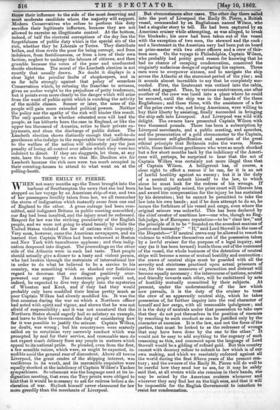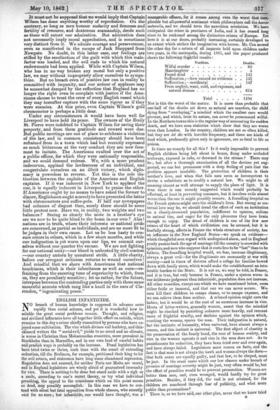THE EMILY ST. PIERRE.
Wilnot many months ago the Trent brought into the aNrbour of Southampton the news that she had been stopped on her voyage by an American ship-of-war, and two of her passengers forcibly taken from her, we all remember the storm of indignation which instantly arose from one end of England to the other. A gross outrage had been com- mitted, said indignant Britons in public meeting assembled ; our flag had been insulted, and the injury must be redressed. Respect for law was the striking peculiarity of the English people, and we were not going to stand tamely by while the United States violated the law of nations with impunity. Very soon, however, came the American newspapers, and we learned that Captain Wilkes had been welcomed at Boston and New York with tumultuous applause : and then indig- nation deepened into disgust. The proceedings on the other side of the Atlantic were in such bad taste. That people should actually give a dinner to a hasty and violent person, who had broken through the restraints of international law in order to do what he believed to be a service to his country, was something which so shocked our fastidious regard to decorum that our disgust positively over- powered our anger. The American people could not, indeed, be expected to dive very deeply into the mysteries of Wheaton and Kent, and if they had they would probably only have muddled their brains pretty much as poor Captain Wilkes had already muddled his. It was the first occasion during the war on which a Northern officer had acted with spirit and vigour, and shown that he was not afraid of responsibility ; and it was not unnatural that the Northern States should eagerly hail so salutary an example, and leave to their Government the duty of considering how far it was possible to justify the seizure. Captain Wilkes, no doubt, was wrong ; but his countrymen were scarcely called on to scrutinize very narrowly conduct which was prompted by zeal for their service, and reasonable men do not expect much delicacy from any people in matters which appeal to its national pride. So pleaded, even from the first, a few sensible voices, which were, as might be expected, in- audible amid the general roar of discontent. Above all towns Liverpool, the great centre of the shipping interest, was vociferous in its wrath, and its mercantile exquisites were equally shocked at the indelicacy of Captain Wilkes's Yankee sympathizers. So vehement was the language used at its in- dignation meeting, that even the Toryprints were obliged to hint that it would be necessary to ask for redress before a de- claration of war. Shylock himself never clamoured for law more greedily than the merchants of Liverpool. But circumstances alter cases. The other day there sailed into the port of Liverpool the Emily St. Pierre, a British vessel, commanded by an Englishman named Wilson, who had a singular story to tell. He had been captured by an American cruiser while attempting, as was alleged, to break the blockade ; his crew had been taken out of the vessel with the exception of two men, the steward and the cook : and a lieutenant in the American navy had been put on board as prize-master with two other officers and a crew of thir- teen men. On the voyage to Philadelphia, Captain Wilson, who probably had pretty good reason for knowing that he had no chance of escaping condemnation, conceived the singularly audacious design of capturing his captors. Three men were to overpower sixteen, and to navigate the ship across the Atlantic at the stormiest period of the year ; and it sounds almost incredible to say that he completely suc- ceeded. First, the lieutenant was enticed into the cabin, seized, and gagged. Then, by various contrivances, one after another of the crew was lured into a place where he could be secured, until the ship was in the hands of the three Englishmen ; and these three, with the assistance of a few of the prize crew who, not being Americans, were willing to buy their liberty by assisting, finally succeeded in bringing the ship safe into Liverpool. And Liverpool was wild with delight. The owners have presented Captain Wilson with two thousand pounds. There has been a subscription by Liverpool merchants, and a public meeting, and speeches, and the presentation of a gold chronometer to the Captain, and immense self-glorification and assertion of the great ethical principle that Britannia rules the waves. Mean- while, those fastidious gentlemen who were so much shocked but a few short months back by the indelicacy of the Ameri- cans will, perhaps, be surprised to hear that the act of Captain Wilkes was certainly not more illegal than that of Captain Wilson. A belligerent has, of course, a clear right to effect a rescue if he can, for it is an act of lawful hostility against an enemy ; but it is the duty of a neutral to submit himself to the law, to which alone he must look for the redress of his wrongs. If he has been unjustly seized, the prize court will liberate him and award him compensation for the injury he has sustained by his detention ; but he cannot be permitted to take the law into his own hands ; and if he does attempt to do so, he incurs the forfeiture of his vessel and cargo, even where the original seizure was unlawful. This has been declared by the chief creator of maritime law—one who, though an Eng- lish judge, is of European reputation—to be " clear law," and the principle of it to be " founded on the soundest maxims of justice and humanity." " If;" said Lord Stowell in the case of the Dispatch—" If neutral crews may be allowed to resort to violence to withdraw themselves out of the possession taken by a lawful cruiser for the purpose of a legal inquiry, and may (as it has been termed) hustle them out of the command of the vessel, the whole business of the detention of neutral ships will become a scene of mutual hostility and contention : the crews of neutral ships must be guarded with all the severity and strictness practised upon actual prisoners of war, for the same measures of precaution and distrust will become equally necessary : the intercourse of nations, neutral and friendly towards each other, will be embittered by acts of hostility mutually committed by their subjects. At present, under the understanding of the law which now prevails, it is the duty of the cruiser to treat the crew of an apparently neutral ship, which he takes possession of, for further inquiry into the real character of herself and her cargo, with all reasonable indulgence ; and it is the duty of neutrals under that possession to take care' that they do not put themselves in the position of enemies by resorting to such conduct as can be justified only by the character of enemies. It is the law, and not the force of the parties, that must be looked to as the redresser of wrongs that may have been done by the one to the other." It would not be easy to add anything to the cogency of such reasoning as this, and comment upon the language of Lord Stowell would be a gilding of refined gold. But this country cannot with decency refuse to submit to law which is of our own making, and which we resolutely enforced against all the world during the first fifteen years of the present cen- tury; and the owners of the Emily St. Pierre will do well to be careful how they send her to sea, for it may be safely said that, at all events while she remains in their hands, she may be seized by the American cruisers whenever and wherever they may find her on the high seas, and that it will be impossible for the English Government to interfere to resist her condemnation. It must not be supposed that we would imply that Captain Wilson has done anything worthy of reprobation. On the contrary, so long as men honour audacity and firmness and fertility of resource, and dexterous seamanship, deeds such, as these will extort our admiration. But admiration does not necessarily imply moral approbation, and is sometimes very distinct from it. We admire courage and perseverance, even as manifested in the escape of Jack Sheppard from Newgate. No doubt, in this latter case, our feelings are stifled by the recollection of the guilt with which this male- factor was loaded, and the evil ends to which his natural endowments had been applied. While with Captain Wilson, who has in no way broken any moral but only a positive law, we may without impropriety allow ourselves to sympa- thize. But no breach even of positive law can in reality be committed with impunity, and our ardour of applause may be somewhat damped by the reflection that England has no longer the right even to complain with justice if the Ame-j choose to treat the crew of every English vessel which they may hereafter capture with the same rigour as if they were enemies. At this price, even Captain Wilson's gold chronometer is perhaps a little dear. Under any circumstances it would have been well for Liverpool to have held its peace. The owners of the Emily St. Pierre were indebted to Captain Wilson for saving their property, and from them gratitude and reward were due. But public meetings are out of place to celebrate a violation of the law, and in common consistency should have been refrained from in a town which had but recently expressed so much bitterness at the very conduct they are now fore- most to imitate. The Americans exulted over the act of a public officer, for which they were nationally responsible, and we could demand redress. We, with a more prudent indecorum, applaud the lawlessness of an individual, and congratulate ourselves on an illicit victory, which diplo macy is powerless to reverse. Yet this is the sole dis- tinction between the exploits of the American and English captains. If it was indecent in New York to applaud the one, it is equally indecent in Liverpool to praise the other. If Americans ought by no means to have asked the former to dinner, Englishmen ought scarcely to have presented the latter with chronometers and coffee-pots. If half our newspapers had columns of disgust then, surely there should be some little protest now. Have we, in reality, two weights and two balances ? Seeing so clearly the mote in a brother's eye are we now to be quite blind to the beam in our own ? Alas ! nations are in truth, where their interests or national pride are concerned, as partial as individuals, and are no more fit to be judges in their own cause. Let us be less hasty to cen- sure errors in others, which in a few short mouths, and while our indignation is yet warm upon our lips, we commit our- selves without one quarter the excuse. We are not fighting for our national unity—our blood is unheated by civil contest —our country untorn by unnatural strife. A little charity, before our arrogant criticism returns to wound ourselves ! And mindful that we share with Americans that national touchiness, which is their inheritance as well as ours—re- fraining from the sneering tone of superiority to which, from us, they are peculiarly sensitive ; let us rather, for the future, interpose between the contending parties only with those same mournful accents which rang like a knell in the ears of Cla- rendon, " ingeminating peace."































 Previous page
Previous page